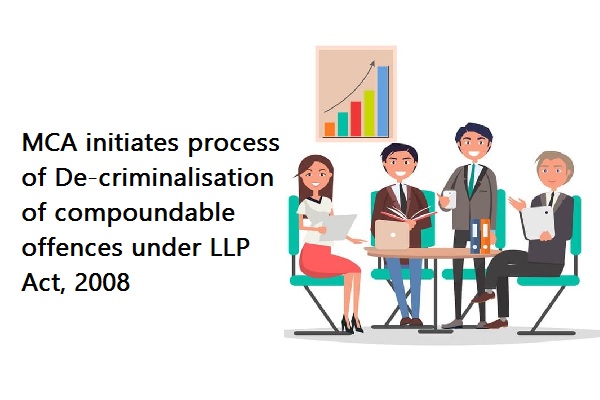With the object of unleashing the entrepreneurial spirits of our youth and to remove the fear of criminal prosecutions for non- substantive minor and procedural omissions and commissions in the normal course of their business transactions, the Government of India in the Ministry of Corporate Affairs (MCA) decided to initiate the process of de-criminalization of compoundable offences under the limited liability partnership (LLP) Act, 2008, for greater ease of doing business for law abiding LLPs.
The Government treats Honest and Ethical Corporate entrepreneurs as wealth creators and nation builders. The objective of the De-criminalization exercise is to remove criminality of offences from business laws where no malafide intentions are involved. In furtherance of the said objective, an exercise was undertaken to identify those provisions of the Limited Liability Partnership Act, violations of which do not result in injury to public interest but are presently criminal in nature with fine as well as punishment after conviction being provided for in the Act.
Principles adopted for Decriminalization of Compoundable Offences:
- Principle-1: Offences that relate to minor/ less serious compliance issues, involving predominantly objective determinations, are proposed to be shifted to the In-house Adjudication Mechanism (IAM) framework instead of being treated as criminal offences.
- Principle-2: Offences that are more appropriate to be dealt with under other laws, are proposed to be omitted from the LLP Act, 2008.
- Principle-3: For non-Compoundable offences that are very serious violations entailing an element of fraud, intent to deceive and caused injury to public interest or non- compliance of order of statutory authorities impinging on effective regulation, Status Quo would be maintained.
In all, twelve (12) offences are proposed to be decriminalized and one (1) provision (Section 73) entailing criminal liability is proposed to be omitted. The 12 de-criminalized offences would then get shifted to IAM thereby de-clogging the criminal courts from routine cases.
In addition to the De-criminalization of the Act the Government also proposes Introduction of certain new concepts into the Act for greater Ease of Doing Business:
- Small LLP: It is proposed to create a class of LLP called as “Small LLP” in line with the concept of Small Companies. Such Small LLPs would be subject to lesser compliances, lesser fee or additional fee and lesser penalties in the event of default. Thus, lower cost of compliance would incentivize unincorporated micro and small partnerships to convert into the organized structure of an LLP and derive its benefits.
- Non-convertible Debentures (NCDs): It is proposed to allow LLPs to raise capital through issue of fully secured Non-Convertible Debentures (NCDs) (as an alternative to equity participation) from investors who are regulated by SEBI or RBI. This will help deepen the Debt Market and enhance the capitalization of LLPs.
- Reduction of Additional Fee: It is also proposed to amend Section 69 of the Act with a view to reduce the additional fee of Rs. 100 per day which is presently applicable for the delayed filing of forms, documents. A reduced additional fee is expected to incentivize smooth filing of records and returns of LLPs and consequently result in an updated registry for proper regulation and policy making.
(Also read: MCA revises threshold for paid up capital and turnover for Small Companies)
(Also read: Direct Tax proposals in the Finance Bill, 2021)
(Also read: International Taxation proposals in the Finance Bill, 2021)
(Also read: Government to introduce Single Securities Markets Code)
(Also read: Further extension for applicability of CARO, 2020 by one year)
(Also read: ICAI issues Code of Conduct for CA Students)
(Also read: CBSE issues Date Sheet for Class X and Class XII Board Examinations 2021)
Disclaimer: The above post includes some content used from PIB India website and executed on this website for fair use only. As this website is of educational nature, hence the content is used for education and awareness to the public.

